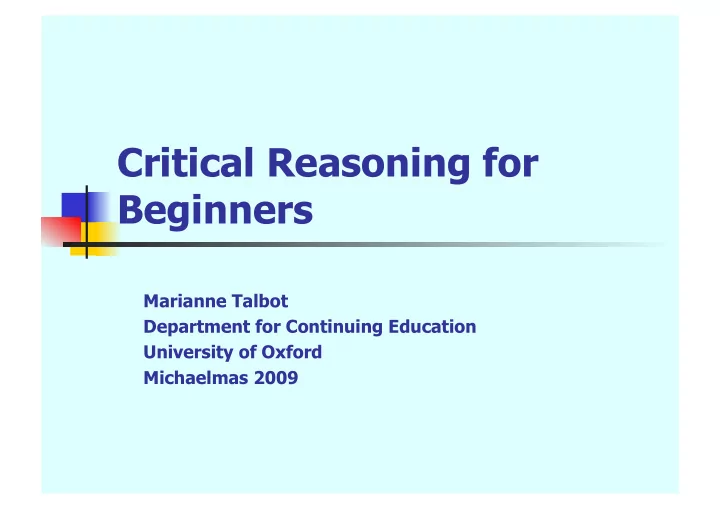

Critical Reasoning for Beginners Marianne Talbot Department for Continuing Education University of Oxford Michaelmas 2009
Recap on last week: arguments are… …sets of sentences such that… …. one of them (the conclusion) is being said to be true… …. the other(s) (the premises) are being offered as reasons for believing the truth of the one
Distinguish arguments from: (a) sets of sentences not related as arguments (b) sentences (assertions)
Today we shall be considering different types of argument
There are two basic types of argument: (i) deductive arguments (ii) inductive arguments
Deductive arguments are such that… … the truth of their premises guarantees… …the truth of their conclusion
Example of a deductive argument: It is Friday Marianne always wears jeans on a Friday, Therefore Marianne is wearing jeans.
Deduction is an ‘either/or’ thing: a good deductive argument gives us conditional certainty a bad one tells us nothing
Inductive arguments are such that… … the truth of their premises… … makes the conclusion more or less probable
Note: Inductive arguments can be either weak or strong
Example of a strong inductive argument: The sun has risen every day in the history of the universe Therefore the sun will rise tomorrow
Example of a weak inductive argument: Every time I have seen Marianne she has been wearing earrings Therefore next time I see Marianne she will be wearing earrings
Can you say which arguments are deductive and which inductive: 1. The sun is coming out so the rain should stop soon. 2. If Jane is at the party John won’t be. Jane is at the party, therefore John won’t be. 3. The house is a mess therefore Lucy must be home 4. Either he’s in the bathroom or the bedroom. He’s not in the bathroom, so he must be in the bedroom. 5. The dog would have barked if it saw a stranger. It didn’t bark, so it didn’t see a stranger. 6. No-one in Paris understands me, so my French must be rotten, or the Parisians are stupid.
Logicians study deduction by studying valid arguments forms…. …arguments that are valid in virtue of their forms as opposed to their contents.
All actions that All men are mortal produce the GHGN are right. Socrates is a man That action produced the GHGN. Socrates is mortal That action was right
Modus ponens: If P then Q, P therefore Q Example: If there are no chance factors in chess then chess is a game of skill. There are no chance factors in chess. Therefore chess is a game of skill.
Modus tollens: If P then Q, not-Q therefore not-P Example: If the dog did not know the visitor well the dog would have barked. The dog did not bark. Therefore the dog did not know the visitor well.
Disjunctive syllogism: P or Q, not-P therefore Q Example: Either we hope for progress through improving morals or we hope for progress from improving intelligence. We can’t hope for progress through improving morals. Therefore we must hope for progress through improving intelligence.
Leibniz’s Law: a is F, a=b, therefore b is F Example: Jane is tall. Jane is the bank manager. Therefore the bank manager is tall.
Syllogism: all Fs are G, a is an F, therefore a is a G Example: All men are mortal. Socrates is a man. Therefore Socrates is mortal.
Note: some arguments are deductively valid but in virtue of their content NOT their form
Deontic logic: Lying is wrong. Therefore we shouldn’t lie.
Modal logic: It is necessarily the case that there are no square circles. Therefore it is not possible that there are square circles.
Temporal Logic: It is raining today. Therefore tomorrow it will have been raining yesterday.
All inductive arguments rely on the assumption of the uniformity of nature…. …the idea that the future will be like the past
Can you see why these rely on the principle of the uniformity of nature? Every day in the Every time I have seen history of the universe Marianne she has the sun has risen. been wearing earrings Therefore the sun will Therefore Marianne rise today will be wearing earrings when I see her today
Within the category of inductive argument there are many different sub-types:
Arguments from analogy: A is like b, A is F, therefore b is F Example: The universe is like a pocket watch A pocket watch has a designer Therefore the universe has a designer
Arguments from authority: Example: Einstein is a brilliant physicist Einstein says relativism is true Therefore relativism is true
Causal arguments: Every time an A occurs a B occurs, therefore As cause Bs
Note: causal arguments can be deductive or inductive… … depending on whether we are arguing from a causal claim… … or to a causal claim
As cause Bs Every observed A has been followed by a B There was an A Therefore As cause Bs Therefore there will have been a B
Your task for the week ahead: See if you can find (in your newspaper, magazine or book) four arguments that fit the patterns we have discussed today.
Next week we will look at identifying arguments and setting them out ‘logic book style’
Recommend
More recommend